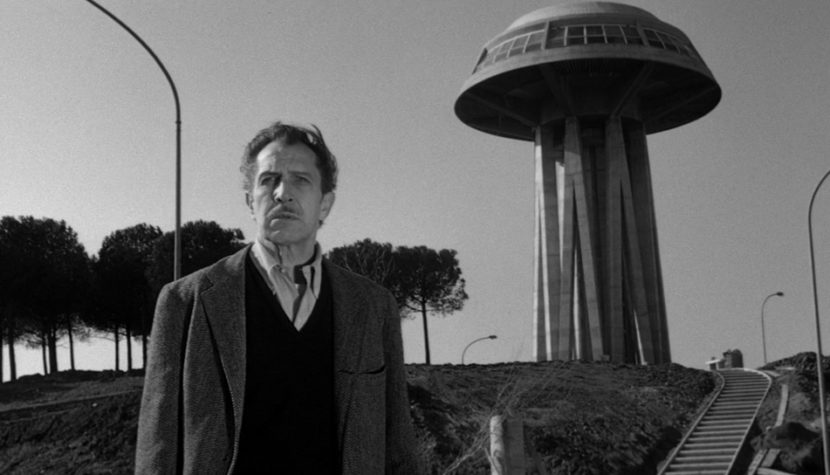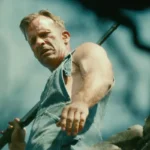THE LAST MAN ON EARTH. Post-apocalypse classic

Warning, the text reveals important elements of the plot.
The end of civilization is a grateful topic for filmmakers. But let’s remember that the images of a world desolate as a result of a catastrophe, stimulating our imagination, have their own specific cinematic pattern. If I had to point to one production that turned out to be an exceptionally inspiring work for post-apocalyptic fantasy (and not only) it would be The Last Man on Earth from 1964.
Sometimes you don’t need great skills or spectacular deeds to become a legend and go down in the annals of history. It is enough that we have a better immune system than others, capable of defeating the virus that the rest of humanity cannot cope with. This is what makes Dr. Robert Morgan, the last human survivor of a biological catastrophe. In the future, the Earth is ravaged by a mysterious virus that turns people into bloodthirsty vampires. Morgan loses first his daughter, then his wife, and finally his own sense of humanity. His daily routine terrifies with ruthlessness and dispassion. During the day, he turns into a hunter chasing people infected with vampirism and ending their lives with an aspen stake driven into the heart. At night, in turn, he becomes the victim, which is why he barricades the door of the house so that the monsters cannot take their vengeance on him.

This is the plot of The Last Man on Earth, which is an adaptation of the well-known and appreciated science fiction novel entitled I Am Legend, by Richard Matheson in 1954. Several more attempts were made to adapt this book later, resulting in The Omega Man with Charlton Heston and I Am Legend with Will Smith. The Last Man on Earth differs from these films primarily in the pace of action and the character of the main character, which are at odds with our habits. Vincent Price, who plays the main role, does not represent either a model of a survivalist, focusing on perfecting survival techniques, or a soldier, characterized by the ability to use weapons. He is rather an ordinary laboratory worker who had to exchange his calm and meticulous work for using an aspen stake, collecting corpses around the city and burning them at the stake. The old life comes back to him thanks to the celebration of the moment of drinking coffee in the morning or reaching for whiskey in the evening. Besides, everything has changed.
One of the advantages of The Last Man on Earth is that the sad black-and-white photos don’t show everything in this story. Even though we see a light-filled retrospective through the middle of the film, we don’t get to know what made Morgan unique. Uniqueness, which, although it can be interpreted as a smile of fate sent from heaven, for Price’s character seems to be rather the effect of a curse. Survival here means living in permanent and deaf loneliness. We also do not know what was the reason for the emergence of the virus – whether it revealed itself naturally or was initiated by humanity itself, even for the purpose of biological weapons. However, the origin of these issues is not important. What is more important is what results from them and what correlations they create with the content of fantasy.

Related:
 SPACE MUTINY: Science Fiction as the Unknown Sister of Battlestar Galactica
SPACE MUTINY: Science Fiction as the Unknown Sister of Battlestar Galactica CHARLES MANSON 's Murders: The Truth Behind Mindhunter and Once Upon a Time… in Hollywood
CHARLES MANSON 's Murders: The Truth Behind Mindhunter and Once Upon a Time… in Hollywood 1922. A Haunting and Disturbing Adaptation of Stephen King's Novella
1922. A Haunting and Disturbing Adaptation of Stephen King's Novella CHRISTINE: A Collision of Visions from Two Great Horror Narrators—John Carpenter and Stephen King
CHRISTINE: A Collision of Visions from Two Great Horror Narrators—John Carpenter and Stephen King
It is no coincidence that The Last Man on Earth was originally supposed to be created in the famous British studio Hammer, which creates horror games. The 1964 adaptation (as well as the novel itself) has a lot in common with horror movies. When the rights were sold to the Americans, the author of the book himself started writing the script. However, he was not satisfied with the effect of self-correction, so he appeared in the credits under the pseudonym Logan Swanson. It must be admitted, however, that the script deals with the topic of vampirism in a rather peculiar way. What until now, due to its magical nature, was reserved for horror, in The Last Man on Earth has been reworked for the needs of science fiction. Vampirism is an incurable disease here, contributing to the downfall of humanity. So it is evil with a human face, not the paranormal, demonic evil typical of horror stories.
What is peculiar is how director Sidney Salkow presented the vampire characters in this story. While vulnerability to garlic and sunlight remain in place, the way they move at night casts doubt on the effectiveness of their attacks. Suffice it to say that Vincent Price would rather go to sleep than guard his home during a routine nighttime vampire invasion. Vampires in The Last Man on Earth are rather sluggish and sluggish shadows of their original human incarnations than cunning and sinister beings from Slavic myths. George A. Romero liked this characteristic apathy and awkwardness, and a few years later, using these features in his Night of the Living Dead, he gave rise to the image of zombies.

As a result of the above-mentioned understatements, it is difficult to treat The Last Man on Earth as a film warning against the threat of self-annihilation looming over civilization. These echoes are more audible in the productions that are the spiritual successors of the 1964 work. The Last Man on Earth itself is rather a symbolic story about the chosen one who loses the clash with the fallen angels, unable to establish contact with those who once were his kin. The antidote that promises deliverance from sin is invented too late.
Therefore, death on the church altar could not be a more eloquent ending. Thus, the one who was supposed to act as a savior is recognized as a schismatic, a false messiah who does not fit into the emerging order. In order to maintain the status quo, he is eliminated by the new society. We have known this story for more than two thousand years. It provides a bitter, yet very suggestive conclusion, reaching the heart of the contemporary non-conformist.

